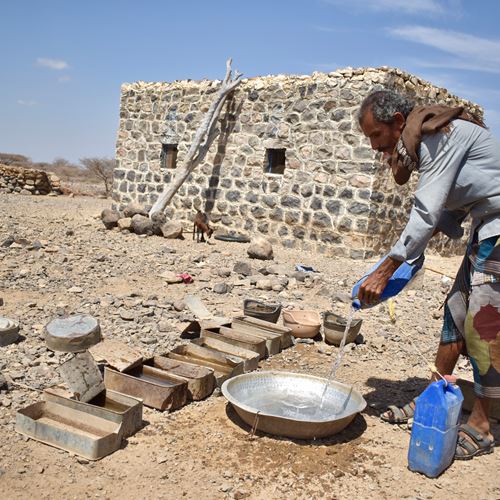News
Joint Statement: Millions still struggling to survive in Yemen, as the cost of food soars 300%, humanitarian actors warn.
One year since the non-renewal of the formal truce in Yemen we, the undersigned 48 organizations, call
for urgent action to address the deteriorating economic crisis affecting civilians across Yemen, but
particularly in areas controlled by the Internationally Recognized Government (IRG).

For the last eight years and since the conflict escalated in 2015, Yemen’s economy has steadily declined. Today, it is on the verge of collapse. While economic challenges are rife across the country, rising inflation and the deterioration of public services are making life unbearable for hundreds of thousands of families in IRG- controlled areas. Power stations are shutting down due to a lack of fuel and high prices as refineries are not operating. As a result, power outages in Aden are reaching 17 hours per day, amid soaring temperatures, impacting service provision and economic activity. The irregularity and delays in the payment of public wages remains a major issue across the country. Across southern governorates, schools struggled to reopen in September because of teacher strikes over pay, disrupting access to education for thousands of children. While protests have been ongoing the past eight years, in recent weeks, they have gained renewed momentum with demonstrators taking to the streets to protest severe living conditions, calling for "bread, water, and power."
As of August 2023, more than 50% of households in IRG-controlled areas are unable to meet their basic food requirements as the price of a minimum food basket – food a family needs to survive for a month - has increased by nearly 300% in the past five years. Basic food prices have also surged exponentially. For instance, the cost of wheat has increased 400 percent – from 9,500 YER in 2018 to 35,400 YER per 50 kilos today. As families struggle to put food on the table, malnutrition increased in 2023 compared to 2022.
Fatma, a 50-year-old single mother from Aden said: “My little children beg me to take them to school. They don’t understand that I can’t buy them lunch, let alone books and clothes. My husband died a few years ago, and we were left with nothing. Sometimes I have to go out and beg for money.”
Across the country, women and children are disproportionately impacted. Women often eat least and last, giving priority to children and other family members, and are further exposed to risks and experience the highest levels of all forms of violence. Girls are at increased risk of early marriage to reduce the number of family members to feed, and as a source of income. Increasingly, people in Yemen are being forced to adopt negative coping mechanisms such as begging for food and money. While children are at increased risk of child labour and begging and may be forced to drop out of school.
To address the deteriorating economic crisis, and alleviate the suffering of civilians, we call for the following urgent actions to be taken:
- The IRG, with support from the international community must take concrete measures to resolve the power crisis and ensure access to basic services, including healthcare, sanitation, water, and education, in coordination with local actors. This must include funding and support for social protection systems, especially for those at risk of food insecurity.
- Parties to the conflict should cooperate to respond to the needs of all Yemenis, including regular public sector salary payments nationwide, affordable basic commodities, the resumption of exports, a functional banking system and facilitating commercial activity.
- The international community should support a fully funded economic recovery plan to stabilize the economy and prevent further food price rises, as well as provide foreign reserves to subsidize commercial imports of food and fuel.
- Donors must fund the 70 percent gap in the humanitarian response for critical sectors including protection, health, education, and disburse existing pledges. Donors should operationalize a humanitarian-development nexus approach and support durable solutions to strengthen resilience and self-reliance.
- Parties to conflict should continue to negotiate towards an inclusive, sustainable peace to prevent further deterioration of the economy. Yemen is at a critical juncture.
Read the whole statement below.
